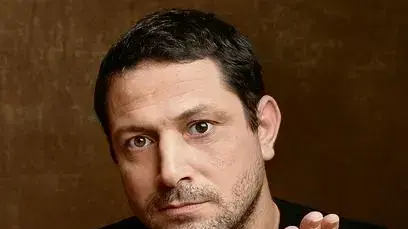"Because I am Arab, I am expected to make films in the style of Gideon Levy's articles"
Tawfik Abu Wail became a sensation of the local cinema about a decade and a half ago thanks to "Atash - Thirst".
Ahead of the screening of a renewed copy of the film at the Jerusalem Festival as part of the fiftieth anniversary celebrations of the Film School at Tel Aviv University, he tells how Communism saved his life and why he won't make any more films
Avner Shavit
07/27/2022
Wednesday, July 27, 2022, 00:00
Share on Facebook
Share on WhatsApp
Share on Twitter
Share by email
Share in general
Comments
Comments
The trailer of the movie "Etash - Thirst" (United King)
The early 2000s were a golden age for local cinema, and in 2004 came one of the peak moments - "Atash: Thirst".
Tawfiq Abu Wail's first feature film came out of nowhere, but took the world by storm, when it won the Critics Association Award at the Cannes Film Festival and among a host of local and international decorations, it caused great resonance and was immediately crowned as a contemporary classic.
A particularly impressive achievement considering the inexperience and age of the director, who was then in his late twenties.
This week, the film receives another honor: the Jerusalem Film Festival will present in a festive premiere a revised copy of it, as part of the restoration project of the Israeli Film Archive at the Jerusalem Cinematheque, which takes care of preserving the best local classics.
"Etash - Thirst" is the newest film to receive this honor.
For comparison, together with it, the festival will present this year in this framework "Hole in the Brick", which was made about forty years before it.
In the case of "Atash - Thirsty", the restoration is a joint project of the archive in Jerusalem and the Tish Film and Television School at Tel Aviv University, which is celebrating its fiftieth anniversary this year.
Abu Wail studied there, as well as the cinematographer Assaf Soderi, and they met during their studies and became one of the greatest prides of the Mossad.
Honored in the same breath as Uri Zohar.
Tawfik Abu Wail (Photo: Yonatan Blum)
"Atash - Thirst" is one of the first films made here in the Arabic language, and Abu Wail was at the time one of the only Palestinian students in the film department.
"My background was different from that of most students," he says in an interview with Walla!
culture.
"I grew up in Umm Al Fahm, in a family with many children from a low socio-economic background. It was always clear that I would learn a 'profession', for example that I would learn to be an engineer. The decision to study cinema was bold, because it was not part of the landscape in which I grew up, and I was really going to study other things - computer science or physics. I decided to study cinema only at the last minute, after the registration had already closed, and I was admitted through the exception committee. There was an age gap between me and the other students, because they had already served in the army and traveled the world, and I was 19. There was also a cultural gap, because Cinema was not part of my life, I saw movies on TV, nothing more."
But you read a lot of books, probably more than many other students.
"My family was poor, but communist, and that's why there were always books around me. Communists consume a lot of books - the basis of communism is in critical theories about society and the system and a subversive reading of history and culture with the aim of changing them, so books are your most important work tool as a communist. Thanks to communism I had access to all kinds of books - not only Arabic literature, but also Chekhov and the like. Communism saved my life, because literature opened my mind and gave me intellectual tools that helped me a lot."
More in Walla!
"I didn't know I was loved so much in Israel, it was exciting to celebrate my birthday here"
To the full article
Winner of the Cannes Critics Association Award.
From "Etash - Thirst" (Photo: Shay Peleg)
For those who didn't watch or don't remember, we'll remind you that "Atash - Thirsty" follows a Palestinian family living in Israel.
The father is sentenced to kill one of his daughters because of an incident related to the honor of the family, but refuses to do so and runs away with her and his partner and his other children to live in the wilderness, where they will be protected from the environment.
This will not end their troubles, because the head of the family is a patriarch, who rules it with a firm hand.
His family is thirsty for liberation and freedom, and the film follows the way it begins to wield the miracle of rebellion.
"Continuing to the previous question, I think there is something communist in the film," says Abu Wail.
"Its central theme is the rebellion and the attempt to establish a new world order, and this is of course related to communism. Besides, its style is anti-Hollywood, which to a certain extent makes it anti-capitalist. The film undermines all the formulas. It builds the story slowly and delicately, like knitting , like when you write a book. He doesn't shoot fireworks into the air, and he doesn't forcefully try to grab the viewer by the throat and shout at him, 'Here's a drama, here's a conflict, don't worry, it won't be boring.' , and even at the time, no one jumped at the bargain, and it was difficult to find commercial distribution for it."
There is a famous saying - whoever was not a communist before the age of 18 has no heart.
Anyone who remains a communist after the age of 18 has no sense.
Do you identify?
(Laughs). I don't know this saying, but I can understand it. Today, at the age of forty plus, I no longer refer to myself as a communist. I'm a post-communist. I don't believe in revolutions, but my worldview is largely based on critical theories I relate to the world in a critical way, and I think the role of art is to challenge and criticize."
Communist movie.
From "Etash - Thirst" (Photo: Shay Peleg)
In a post he wrote on Facebook this week, Abu Wail recalled the process of searching for the scene for the film.
"I took my friend and partner Assaf Dori to an abandoned IDF military camp on the 'liberated' lands in Umm al-Fahm. I said to Assaf, 'It seems to me that our family in the film will live here.' He looked at me and said, 'Let's shoot the whole film here.' , it's a million dollar location, bro."
For those who happen to live under a rock and are not aware of what is happening here, the Shebih is a training area for warfare in a built-up area, a sort of model of a village that is built in the middle of nature solely for military needs, but no civilians live in it. "They build this area with the strongest concrete available , then there is a contrast between the concrete and what surrounds it - the pastoral valley, the hill line, the sky, the path.
The concrete buildings literally burst violently into the beautiful landscape, and this powerful contrast tempted us to film in it," says Abu Wail. "The original intention was to take the family out to the village at some point, but then I decided to rewrite the script so that it takes place entirely in this area.
I wanted to take on a challenge, and tell a story in one place, without leaving it."
How would you describe the collaboration with Assaf Sodri?
"It took me a while to find my place in film studies, but in the end I found my friends, chief among them Assaf Soderi. He is not only a co-creator, he is a soulmate. We both have a passion for the same kind of cinema - Westerns, Italian cinema. 'Atash - In my opinion, 'Thirst' corresponds with the films of the Tabiani brothers, and with European cinema's preoccupation with family decay. Assaf and I are one soul, we understand each other even when there are problems, and then we find the solutions relatively easily."
Can you tell us a little about the restoration process?
"For many years I wanted to restore the film, but it is an expensive business that costs tens of thousands of shekels, so I am glad that the archive and the university took up the gauntlet. The film was shot on film, and over time the raw materials accumulated a lot of dirt and scratches. The cleaning is the work of ants, Sisyphean and endless work. Now I have watched In the near-final version. Even after working so hard, there's still quite a bit of dirt left. That's how it is. Besides, we worked on the copy in a raw version, without colors, and we had to redo the colors. I'm glad for the opportunity to do all this, but Our conditions are modest. In America, the restorations are done with very complex and expensive means."
When the director and cameraman are soul mates.
From the footage of "Etash - Thirst" (Photo: Shay Peleg)
How do you look at the film today?
"It's complex. I don't want to get hung up on tall trees, but once Bertolucci was asked a similar question and he said, 'When I look at the previous film I made, I see a corpse.' When you look at your previous film, you look at the situation in which you made it, About the state of mind you were in, about the vision and dreams you had, and you also understand how you changed and the gap between who you were and what you are now. There is something shocking and powerful in this gap."
Where do you see the film's impact and legacy?
"Personally, I think our role as creators is to pave the way for the people who came after us. My path was also paved by others - I saw films by Ilya Suleiman and they opened my eyes. You do something from within yourself and it gives hope and opens the door for other creators.
Requiem for a Dream.
From "Etash - Thirst" (Photo: Shay Peleg)
About seven years after "Atash - Thirsty", Abu Wail directed his second film, "Disintegration", which, as the name implies, followed the upheavals that Palestinian couples go through.
It was a beautiful film, but unlike the director's debut work, it did not gain any local or international resonance, perhaps because it was intimate, romantic and universal, and did not deal with politics or conflict.
"This is something I came across when I was in university," says Abu Wail.
"Because I am Arab, I am expected to make films that will be in the style of Gideon Levy's articles. This happened to me in Israel, but also with European funds. They looked at 'Disintegration' and asked - 'This is a story about a couple experiencing an existential crisis, so what is Palestinian about it? It It could also have happened in Paris or Rome, where is the Palestinian story?'. Because I was born as a Palestinian, and another one who lives in Israel, I am expected to be an ambassador, to represent something, but I don't want to be an ambassador. I am an individual, and I hardly represent myself."
"The Decay" was released more than a decade ago, and remains the last long feature film of Abu Vayl, who in recent years has been focusing on television work - "The Boys" of course, and more recently "Unknown".
He was supposed to shoot a new film, but at this point gave up on the project.
"I went to shoot a film two and a half years ago", he says, "but then the corona virus came and killed the cards. It stopped the momentum of the production, and even when we returned to normal, it was no longer the same. The corona completely shook the market. All over the world, the revenues of theaters have been cut in half at least. The adult audience that used to see quality movies got used to watching movies on television, and there is no longer so much room for art cinema. If it used to be on the fringes, then today even that is no longer valid. Amazing directors do amazing things, and then they have to beg the audience to come So that they don't take their film off the screens, so there is no motivation to direct a new film. I am currently working on a series."
Bye cinema, hello TV.
From "The Boys" (Photo: Ran Mendelson)
And in the meantime, with Oved published a book of articles about a previous series he directed, "The Boys".
It is very rare in local terms for such a publisher to publish their academic book on a series.
"Because many intellectuals from all kinds of fields wrote about the series, so that's where the motivation came from to publish the book. You don't have to like the series to read it, because it also has articles that criticize it."
Do you sometimes wonder what would have happened if "Hatash - Thirst" had been released in the age of social networks?
After all, this is a very critical film, maybe there was an attack on it like there was on "The Boys".
"It really came out at a time when there was no Facebook yet, which today seems like ancient times, but I must tell you that in any case, the film was loved in the Arab world, from Palestinian society in Israel to Tunisia. It is a film that corresponds with Arabic literature, with Arab thought, and with many issues that are relevant to Arab society, and he was received with much appreciation and love. He continues to influence people and move them,
"Etash - Thirst" will be screened at the Jerusalem Film Festival this Friday (July 29) at 1:00 p.m.
See more details on the official website.
culture
Theater
Cinema news
Tags
Tawfik Abu Wail
the boys







/cloudfront-eu-central-1.images.arcpublishing.com/prisa/GUNW6JJDHBCKPFW2RE2KTZ6N7M.jpg)







